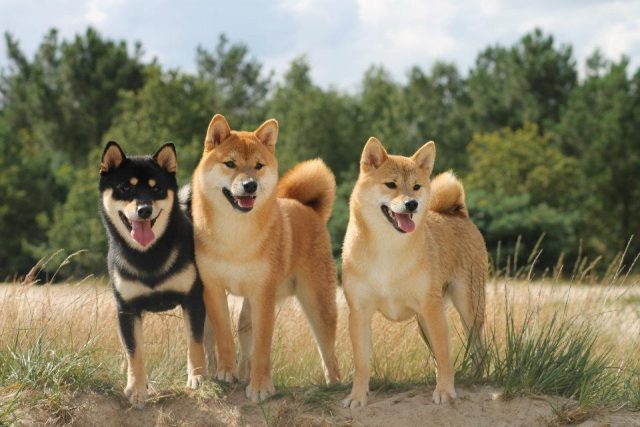Type the name of the breed you're looking for below
[wpdreams_ajaxsearchlite] Don't see the breed your're looking for? Click here and let us know!
Breed Characteristics
1 paw - breed exhibits the least amount of this characteristic
5 paws - breed exhibits most amount of this characteristic
Shiba Inu
| Other Names | Japanese Shiba Inu, Japanese Small Size Dog, Shiba Ken |
| Nicknames | Shiba |
| Country of Origin | Japan |
| Weight | Males: 18 - 25 lbs. (8 - 11 kg) Females: 15 - 20 lbs. (6.8 - 9 kg) |
| Height (at withers) | Males: 14 - 16 in. (36 - 41 cm) Females: 13 - 15 in. (33 - 38 cm) |
| Coat | The Shiba has a double coat that is very plush and soft. The coat contains essential oils that help protect the animal so the animal should not be bathed any more than necessary. |
| Colour | Shibas may be red, black and tan, or sesame (red with black-tipped hairs), with a cream, buff, or grey undercoat. They may also be white (cream), though this colour is considered a "major fault" by the American Kennel Club and should never be intentionally bred in a show dog, as the required markings known as "urajiro" (裏白) are not visible; "Urajiro" literally translates to "underside white". Conversely, a white (cream) coat is perfectly acceptable according to the British Kennel Club breed standard. The urajiro (cream to white ventral colour) is required in the following areas on all coat colours: on the sides of the muzzle, on the cheeks, inside the ears, on the underjaw and upper throat inside of legs, on the abdomen, around the vent and the ventral side of the tail. On reds: commonly on the throat, forechest, and chest. On blacks and sesames: commonly as a triangular mark on both sides of the forechest. |
| Litter Size | 1 - 3 puppies |
| Life Span | 13 - 16 years |
| Origin & History | Inu is the Japanese word for dog, but the origin of the prefix "Shiba" is less clear. The word shiba means "brushwood" in Japanese, and refers to a type of tree or shrub whose leaves turn red in the fall. This leads some to believe that the Shiba was named with this in mind, either because the dogs were used to hunt in wild shrubs, or because the most common color of the Shiba Inu is a red color similar to that of the shrubs. However, in an old Nagano dialect, the word shiba also had the meaning of "small", thus this might be a reference to the dog's diminutive stature. Therefore, the Shiba Inu is sometimes translated as "Little Brushwood Dog". The Shiba have a long and interesting history. Shibas were originally bred to flush birds and small game. The breed was brought to Japan from China nearly two thousand year ago. The Shiba is the smallest of the six distinct breeds that were bred from the original dogs that were probably Chow Chow. It is interesting to note that some of the original six are now extinct. While they were first used for hunting, they are now primarily kept as pets, both in Japan and the United States. It is interesting to note that there are more Shibas in Japan than any other breed. In the 7th century AD, the Yamato Court established a dog keeper's office that was charged with maintaining the Japanese native breeds as an integral part of Japanese culture. This was a good idea that did not work. Even though the country was closed to foreigners from the 17th through 18th centuries, some European dogs were imported and bred with native dogs living in the more populated areas. Dogs in the countryside, however, remained relatively pure. There were originally three main varieties of Shiba and each was named for its region of origin. It is because of these regional differences that we have the various breeds known today. |
| Personality | The Shiba is alert, confident, courageous and bold. It is loving, kind, trainable and brave. It is clean and most try to avoid puddles and are relatively easy to housebreak. They bark little and bond closely with their handler. Playful and delightful, a well-adjusted Shiba is good with kids, other dogs and cats. Active, lively, agile and fast. Socialize this breed well as a puppy, as they can be reserved with strangers. If the Shiba is not completely convinced that its handler can handle the pack leader position and regards itself as stronger minded it will become a bit stubborn as it will believe it needs to make up its own rules. Proper human to canine communication is essential. A natural hunting dog, the Shiba should not be trusted alone with small pets such as rabbits, guinea pigs, rodents and small birds. Be careful when taking them off leash as they like to chase, especially if they do not regard their owners as a strong pack leader. Adapts well to traveling. Make sure you are this dog's firm, confident, consistent leader, providing daily pack walks to avoid behavior issues. |
Care Requirements
| Health | Like all breeds of this size, the Shiba can have Health issues. Most of these problems can be avoided with proper nutrition, hygiene, and regular visits to the vet. The Shibas can have some hereditary defects, for which all reputable breeders screen their Breeding stock. patellar luxation will sometimes appear in Shibas. This ailment causes loose kneecaps and is usually not severe enough to be detrimental to a pet. An experienced veterinarian can detect this condition early on. Moderate to severe patellar luxation can easily be corrected by surgery and the dog will lead a normal, healthy life. Another health issue is hip dysplasia. It is not as serious in the Shiba as it is in large breeds of dogs but it can occur. Something that many new owners do not know is that the Shiba can be prone to Allergies. If you suspect Allergies, you should take the animal to the vet as soon as possible as the symptoms can range from mild to very severe. The Shiba may also suffer from Glaucoma. This can be detected early on through regular visits to the vet. As with many dogs, eye problems can present problems and owners are encouraged to have their dogs eyes checked regularly. These eye test are now easy to conduct and are worth the small added costs. Another eye issue that all dog owners need to be aware of is PRA, Progressive Retinal Atrophy. This is an genetic disorder which makes prevention of the disease something of an issue. Research is being done on this issue ever now. For those interested, much more information on the possible ailments that can be present in this size of animal can be found online or through your vet. |
| Grooming | The Shiba has a clean, coarse, stiff, shorthaired coat that is easy to groom. Brush with a firm bristle brush to remove the dead hair and bathe only when absolutely necessary as it removes the natural waterproofing of the coat. This breed is a seasonally heavy shedder. |
| Exercise | The Shiba Inu is an undemanding dog that will adapt to your circumstances, so long as it gets a daily walk. It is a very active dog and will be healthier and happier with regular exercise. This breed can walk for hours on end as it has tremendous endurance. |
| Other Considerations | The Shiba will do okay in an apartment if is sufficiently exercised. It is moderately active indoors and will do best with at least an average-sized yard. The Shiba's waterproof, all-weather coat protects it in both cold and hot conditions, so it can live outdoors if you have a secure yard of reasonable size. However, it does regard itself as part of the family and does not like to be left alone outside. This breed would be much happier living indoors with its family. The oldest known Shiba, Pusuke, died at age 26 in early December 2011 and was the oldest dog alive at the time. |



